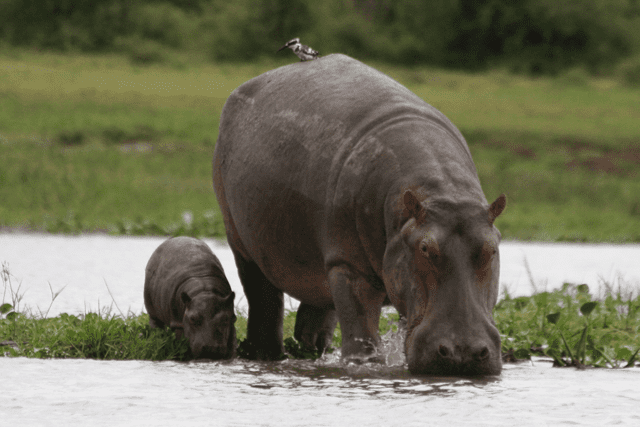What hippos eat is an interesting curiosity that most people will ask while on safari – especially after seeing a hippo yawn. The massive size, wide mouth, razor sharp incisors and bad temper would make you wonder that all that is for.
Hippos are the third-largest land mammal on earth following the elephant and rhinoceros. An adult hippo weighs between 1,500 to 1,800 kilograms and stands at about 1.5 meters tall.
When you visit a national park which has hippos, you will mostly find them in water and not feeding. This brings us to the question of what hippos eat. Being the third-largest land animal requires a lot of food.
This is because they feed through the night. While you will see a few hippos feeding on the river bank during the day, this comprises a very tiny portion of their total food intake.

In this article, we are going to look at what food a hippopotamus eats and what are its eating habits.
What DO Hippos Eat?
Hippos are herbivores and mainly feed on short grass. This is the common short grass found in the Savannah game parks. Hippos feed on the same short grass that other herbivores like zebras, Uganda mobs, zebras and buffaloes can feed on.
To balance their diet out a little bit, hippos will eat a few species of wild fruit. This makes a very tiny percentage of their diet.
During the day, a hippo might be seen eating the grass that is found on the banks of the rivers and lakes that they inhabit. This is because it is much easier and more convenient to take short trips from the water during the day to feed and return when it gets a little hot.
In the evening, hippos go out of the water for some serious feeding. They can move long distances of more than 8 kilometers in search of food.
During this nocturnal feeding activity, an adult hippo can eat an average of 40 kilograms of grass. The Hippo uses its lips to pull grass and its 20-inch-long teeth to chew before swallowing.
Feeding Adaptations of Hippos
The alimentary canal of a hippo is long which helps to reduce the speed of digestion. This increases the time for the body to absorb all the vital nutrients required to keep the hippo alive and to stay for longer hours before feeding again.
A hippo’s stomachs are multi-chambered and can store food for a long time which explains why they spend a lot of time in water and can only feed for longer periods in the evening.

Feeding Habits of Hippos
Hippos take the same path for grazing in the evenings. The feeding area can expand to as far as 2 miles from the water, they feed in a circle pattern and this pattern keeps getting wider and wider.
Even though the hippos stay together in groups and also mate from the water, they do prefer feeding individually. They follow these feeding trails every day to feed and trace back when the sun comes up high.
Hippos feed during the night because they need protection from the hot savannah sun. Hippos have no sweat glands and therefore the hot sun is bad for their skin.
This is why they hide in water for much of the day, and also why they secret a pinkish around their ears and eyes. Here is a good article we made about hippo facts that can give you further interesting insight.

Do Hippos eat Meat?
Hippos are fundamentally known for feeding on grass, but a recent study seems to contradict this.
PhD student Leejiah Dorward, in a paper he published in the African Journal of Ecology, provided a detailed account of watching two hippos feeding on the carcass of a dead crocodile. The first verified account goes back as far as 1995 when Dr Joseph Dudley from the University of Alaska while on his visit to Hwangwe National Park in Zimbabwe.
Dr Keith Eltringham (1999) confirmed that hippos eat meat because of insufficient nutrients, especially in instances when there are limited sources of food.
There are many other cases where it is said that they violently chop down on the meat as a way of ‘killing’ the animal that has disturbed them. As a way of ensuring that death is reached and the animal is left in many pieces.
Besides these cases, it is still widely accepted that hippos are herbivores because of their ‘herbivore-like’ digestive system. As you go on safari, don’t raise your hopes of seeing a carnivorous hippo yet – because the few cases have been far and in-between to warrant any promises.
Their ability to tear apart most animals – including lions or crocodiles is why the hippo is the most dangerous wild animal in the African savannah. Yes, the hippo is more dangerous than a lion.
You can check out our article about some interesting facts about hippos – which will give you more insight about hippos, and why they aren’t to be messed with.
How Baby Hippos Eat?
Baby hippos are born weighing an average of 40 kilograms. This is a massive size that needs great quantities of food.
Baby hippos (calves) can suckle on their mothers for milk underwater. They close their eyes and nostrils and keep feeding while submerged.
Baby hippos start to feed on grass at the of 3 weeks. Calves continue to suckle for up to 8 months when they can start to graze at a safe distance from their mother.
Conclusion
And there you have it. The information about what hippos eat, and the related habits. Hippos are not just interesting in regards to what they eat, they are so much more.
Here is our popular article that lists more than 37 interesting facts about hippos. Learn facts about their strength, their conservation status, where they can be seen and how they are the most dangerous animal in the African Savannah.








